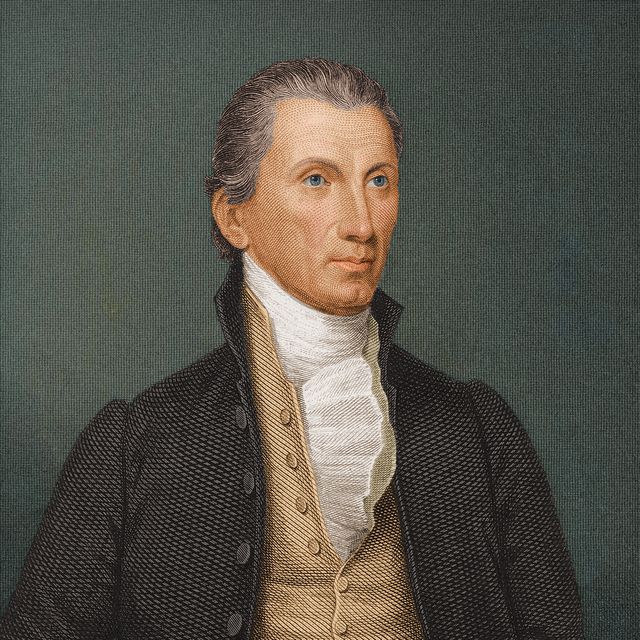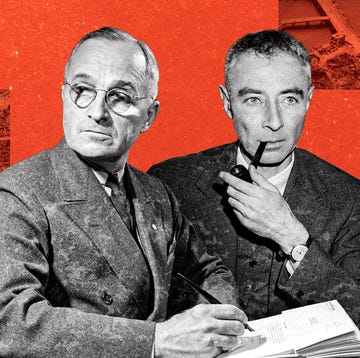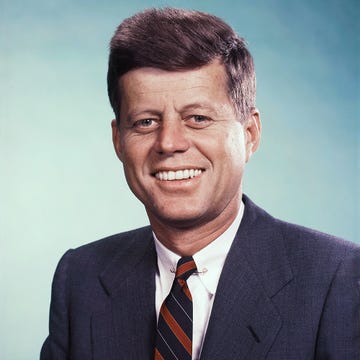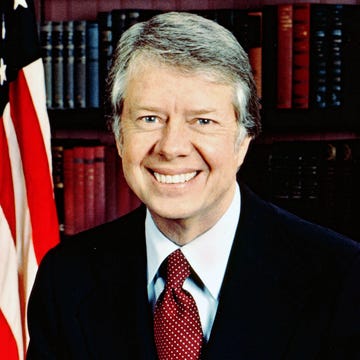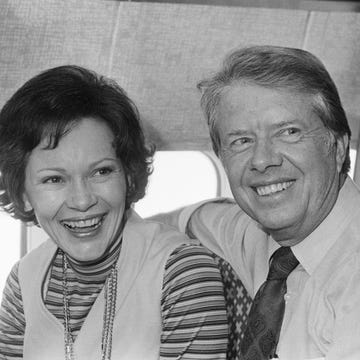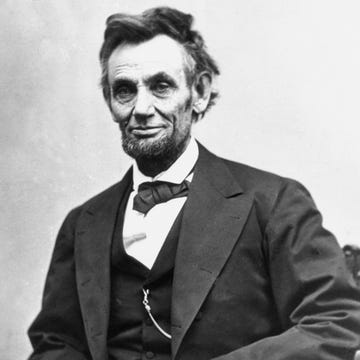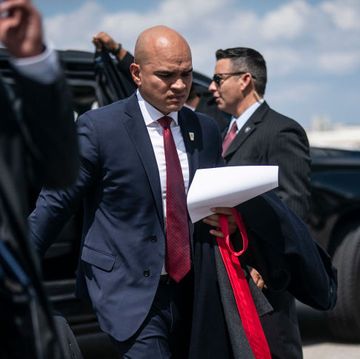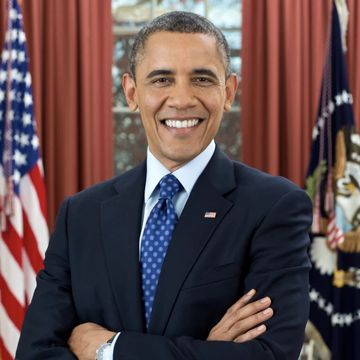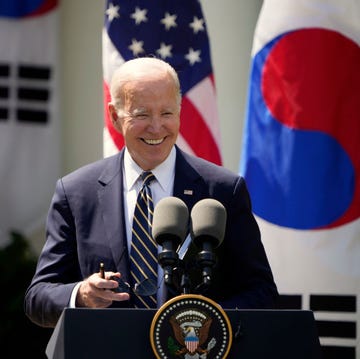(1758-1831)
Who Was James Monroe?
James Monroe fought under George Washington and studied law with Thomas Jefferson. He was elected the fifth president of the United States in 1817. He is remembered for the Monroe Doctrine, as well as for expanding U.S territory via the acquisition of Florida from Spain. Monroe, who died in 1831, was the last of the Founding Fathers.
Early Life
Monroe was born on April 28, 1758, in Westmoreland County, Virginia, to Spence Monroe and Elizabeth Jones Monroe. Spence was a moderately prosperous planter and carpenter whose family emigrated from Scotland in the mid-1600s. First tutored by his mother at home, Monroe attended Campbelltown Academy between 1769 and 1774, and was an excellent student.
As the eldest of several children, Monroe was expected to inherit his father's estate, but the events of 1774 turned his life in new directions. His father died that year, and young Monroe soon enrolled at Virginia's College of William & Mary with intentions of studying law, but dropped out just months later to fight in the American Revolution. His first act of rebellion was to join several classmates and raid the arsenal of the British royal governor, escaping with weapons and supplies that they turned over to the Virginia militia. He soon joined the Continental Army, becoming an officer in 1776, and was part of General Washington's army at the Battle of Trenton, where he was severely wounded.
Political Career Beginnings
After the war, Monroe studied law under the tutorage of Jefferson, beginning a life-long personal and professional relationship. In 1782, he was elected to the Virginia House of Delegates, and from 1783 to 1786, he served in the Continental Congress, then meeting in New York. While there, he met and courted Elizabeth Kortright, the daughter of a prosperous New York merchant. The couple married on February 16, 1786, and moved to Fredericksburg, Virginia. Monroe proved to not be as successful a farmer as his father and, in time, sold his property to practice law and enter politics.
After the 1787 Federal Convention, Monroe initially joined the anti-Federalists in opposing ratification of the new constitution because it lacked a bill of rights. However, he and several key figures withheld their reservations and vowed to push for changes after the new government was established. Virginia narrowly ratified the Constitution, paving the way for a new government.
In 1790, Monroe ran for a House seat but was defeated by James Madison. Monroe was quickly elected by the Virginia legislature as a United States senator, and soon joined the Democratic-Republican faction led by Jefferson and Madison opposing the Federalist policies of Vice President John Adams and Secretary of the Treasury Alexander Hamilton. Within a year of his election, Monroe rose to become his party's leader in the Senate.
Virginia Governor and Cabinet Member
After serving as U.S. minister to France from 1794-96, Monroe returned home to spend three terms as Virginia governor. With Jefferson now occupying the Presidential Mansion, Monroe was tapped to aid negotiations for the 1803 Louisiana Purchase, before he took over as minister to Great Britain until 1807.
Following another brief stint as Virginia governor, Monroe was appointed President Madison's secretary of state in April 1811. Monroe assumed the additional responsibilities of secretary of war during the latter stages of the War of 1812, making him the only person in U.S. history hold two Cabinet positions at once.
U.S. Presidency
Following the custom set by President Washington of only serving two terms, Madison decided not to run for a third term in 1816, paving the way for Monroe to be the Democratic-Republican candidate. With little opposition from the now-fading Federalist Party, Monroe became the fifth president of the United States. He began his presidency with a tour of the northern states, during which time a Boston newspaper described Monroe's reception as an "Era of Good Feelings."
The declaration was more than media hype. The United States could claim a victory in the War of 1812 because of the favorable peace treaty. The nation's economy was booming and the only opposing political party, the Federalists, was on life support. During the first year of Monroe's administration, he continued his outreach to other parts of the country with successful tours in 1818 and 1819. He also made some smart choices to fill his cabinet, appointing a Southerner, John C. Calhoun, as secretary of war, and a Northerner, John Quincy Adams, as secretary of state.
The good feelings were beginning to dwindle by 1819 when the nation's first economic depression took root. Monroe faced another potentially messy situation with the dispute over Missouri's admission to the Union as a slave state, though this was resolved with the addition of Maine as a free state under the Missouri Compromise of 1820. Later that year, with the Federalists unable to put forth a presidential candidate, Monroe cruised to reelection by earning all but one of the electoral votes.
The 'Monroe Doctrine'
After the Napoleonic Wars, which ended in 1815, many of Spain's colonies in Latin America declared their independence. Americans welcomed this action as validation of their spirit of Republicanism. Behind the scenes, President Monroe and Secretary of State Adams informed these new countries that the United States would support their efforts and open up trade relations. Several European powers threatened to form an alliance to help Spain regain its territories, but pressure from Great Britain, who also saw merit in independent Latin American countries, stopped their efforts.
On December 2, 1823, Monroe formally announced to Congress what would become known as the "Monroe Doctrine." The policy stated that the Americas should be free from future European colonization and that any interference with independent countries in the Americas would be considered a hostile act toward the United States.
Later Years and Death
At the conclusion of his second term in March 1825, Monroe returned to his estates in the Old Dominion. He served on the University of Virginia's Board of Visitors, and was elected president of the Virginia Constitutional Convention of 1829-30, before stepping down due to failing health.
Following the death of his wife in 1830, Monroe moved to New York City to live with his daughter Maria. He died at her home in Manhattan on July 4, 1831, exactly five years after the passing of fellow Founding Fathers Jefferson and Adams.
Initially buried in the New York family vault of his son-in-law Samuel L. Gouverneur, Monroe was reinterred in Virginia's Hollywood Cemetery in 1858.
QUICK FACTS
- Name: James Monroe
- Birth Year: 1758
- Birth date: April 28, 1758
- Birth State: Virginia
- Birth City: Westmoreland County
- Birth Country: United States
- Gender: Male
- Best Known For: The fifth president of the United States, James Monroe is known for his "Monroe Doctrine," disallowing further European colonization in the Americas.
- Industries
- U.S. Politics
- Astrological Sign: Taurus
- Schools
- Campbelltown Academy
- College of William & Mary
- Death Year: 1831
- Death date: July 4, 1831
- Death State: New York
- Death City: New York
- Death Country: United States
Fact Check
We strive for accuracy and fairness.If you see something that doesn't look right,contact us!
CITATION INFORMATION
- Article Title: James Monroe Biography
- Author: Biography.com Editors
- Website Name: The Biography.com website
- Url: https://www.biography.com/political-figures/james-monroe
- Access Date:
- Publisher: A&E; Television Networks
- Last Updated: October 27, 2021
- Original Published Date: April 2, 2014
QUOTES
- It is only when the people become ignorant and corrupt, when they degenerate into a populace, that they are incapable of exercising their sovereignty.
- The public lands are a public stock, which ought to be disposed of to the best advantage for the nation.
- Never did a government commence under auspices so favorable, nor ever was success so complete.
